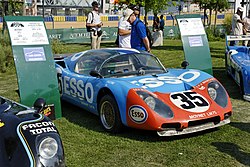
The 24 Hours of Le Mans (French : 24 Heures du Mans) is an annual 24-hour automobile endurance race organised by the automotive group Automobile Club de l'Ouest (ACO) and held on the Circuit de la Sarthe race track close to the city of Le Mans, the capital of the French department of Sarthe. [1] [2] It was first staged as the Grand Prix of Endurance and Efficiency in 1923, [3] after the automotive journalist Charles Faroux, the ACO general secretary Georges Durand and the industrialist Emile Coquile agreed to hold the race for car manufacturers to test vehicle durability, equipment and reliability. [1] From the first event in 1923, the ACO advocated sexual equality by permitting women to participate at Le Mans, ranking them equally with men under its performance standards. [4] After the fatal accident of Annie Bousquet at the 1956 12 Hours of Reims as well as spectator deaths in the 1955 Le Mans disaster and the 1957 Mille Miglia, the ACO barred women from entry. [a] [6] [7] The restriction was lifted two months before the 1971 race, possibly due to the women's liberation movement reaching French motorsport. [8]
Contents
As of the 2025 24 Hours of Le Mans , [update] there have been 68 female drivers representing 15 countries who have started the race a total of 163 times and have finished on 92 occasions. [b] [10] Anny-Charlotte Verney of France holds the record for the most starts in the race with ten. [11] Switzerland's Rahel Frey is second with eight starts and Belgian Vanina Ickx is third with seven starts. The first two female drivers to compete at the event were Marguerite Mareuse and Odette Siko in 1930. France is the most represented country, having produced 24 female participants, followed by the United Kingdom with 17 female drivers and Belgium with five female racers. Colombia and the Netherlands became the latest countries to be represented when Tatiana Calderón and Beitske Visser made their debuts in 2020. The two most recent women to make their Le Mans debuts were Jamie Chadwick and Célia Martin in 2025. [10]
Since the first race in 1923, there have been 31 all-female squads, consisting of either two or three drivers. There have been two all-female teams who have won their class. [10] The first all-female crew to win their category was the "Christine" – Ecurie Seiko team of Christine Beckers, Yvette Fontaine and Marie Laurent in the 1974 edition and the second was the Société Esso trio of Christine Dacremont , Marianne Hoepfner and Michèle Mouton in the 1975 race. [12] [13] The race to feature the highest number of all-female squads was the 1935 event featuring four teams. [10] The highest overall finish by an individual woman at Le Mans was achieved by Siko, who came fourth in the 1932 edition. The best performing all-female team was the seventh-placed Mme Mareuse duo of Maruese and Siko in the 1930 race. [11]







